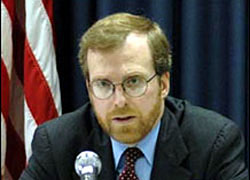David Kramer: “We won’t sit down to table of negotiations until Kazulin is imprisoned”
9- 12.03.2008, 10:40

Today release of Alyaksandr Kazulin is the only condition the US and the EU set forward before start a “dialogue about a dialogue” with Belarus: to sit down to table of negotiations and discuss steps for improving relations. The axis Washington-Minsk is base on a person who is called “last political prisoner of Europe”.
In an interview to “Belorusskie novosti” Deputy Assistant Secretary of State for European and Eurasian Affairs David Kramer explained that the reason of the recent crisis in Belarusian-American relations is “disinclination of the Belarusian government to release Alyaksandr Kazulin”.
Kramer states that the US decided to impose punitive sanctions against certain representatives of companies of Belarus with regret. He said in 2007 we had an impression on choice was left for is: no changes with release of political prisoners took place, but many facts showed the political situation was deteriorating.
As a result, David Kramer said, in summer 2007 the U.S. expanded its visa ban list targeting Belarusian officials and introduced the sanctions against Belneftekhim in November. At the same time, Kramer specified, talks with the Belarusian side continued. Thus, in January 2008 the sides discussed possibilities of release of political prisoners.
“We have explained to the government in Belarus what we would do if the political prisoners were released. We thought we had an understanding with them that would pave the way for the release of all of them by February, and unfortunately the government in Belarus has not lived up to its side of the bargain,” Mr. Kramer said. David Kramer stressed that before the consultations and during the talks the U.S. said that otherwise the issue of “expanding sanctions” would be considered.
The U.S. official demonstrated full understanding of the situation in Belarus, spoke without equivoques. “Unfortunately, our hope that he [Kazulin] would be released first in February, as we were told, and then soon after did not materialize,” Mr. Kramer said. As said by him, Minsk could have dared to release the former presidential candidate completely, not just for three days. This step could be the final stage of political prisoners’ release in Belarus.
But Kazulin returned to prison, and the U.S. continued exerting pressure on Belarusian government demanding Kazulin’s unconditional release. The US and Belarusian governments continued discussions on the release of the former presidential candidate until March 5, he noted.
On the next day the Department of Treasury posted on its website “a further clarification of the sanctions we imposed on Belnaftakhim” on March 6, Mr. Kramer said. Mr. Kramer thinks the official Minsk reacted to this document.
According to the representative of the Department of the State, it cannot be a surprise for the Belarusian government that the U.S. would be ready for further sanctions believing they have no other choice. He reminded Ambassador Karen Stewart spoke about a possibility of expanding sanctions, as well as he himself in one of interviews. Threats of Lukashenka to throw away Karen Stewart are viewed like a reaction to the pressure by the U.S.
Release of Alyaksandr Kazulin is a chance for Belarus to prevent new sanctions, Mr. Kramer stressed. Should Mr. Kozulin's release be made permanent, all internationally recognized political prisoners would have been released, and the U.S. would be prepared to begin a dialogue with Belarus on further steps to improve bilateral relations, not only with the U.S., but with the EU as well.
As said by Mr. Kramer, the U.S. closely cooperates on the issue of political prisoners with the EU. The fact that five of them including Zdzvizhkou were released was viewed positively. (Zdzvizhkou was not on the list of political prisoners, but his issue was discussed with the official Minsk as well). The U.S. hailed their release. At the same time the U.S. and the E.U. made it understood to the Belarusian regime that for the process of improvement in relations to start, not a single political prisoner should stay in Belarus, Mr. Kramer said.
If Kazulin would be released, no new sanctions would be imposed, and a chance for rapprochement with the West would appear for Belarus. As said by a representative of the U.S. government, the reaction of the U.S. to Kazulin’s release would be “positive, extremely positive”. The U.S. and the E.U. would not lift the existing sanctions, either the black list or the decision on freezing accounts. However, a dialogue would be opened on further steps the Belarusian side expected from us or the U.S. would like to embark on.
The U.S. hopes that the last political prisoner would be released soon. At the same time, as said by the representative of the State Department, variants of measures to be taken in case of lack of progress are still considered.
The E.U. and the U.S. are ready for the dialogue with the government. If a number of requirements had been set forth earlier (freedom of expression, freedom of assembly, fair elections), today only one is left. It’s not too late still, Mr. Kramer said. But the U.S. won’t seat down to the table of negotiations until Kazulin stays in prison.









